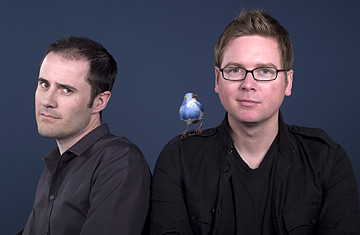
Evan Williams and Biz Stone of Twitter
(6 of 8)
ADVERTISING. Today the language of advertising is dominated by the notion of impressions: how many times an advertiser can get its brand in front of a potential customer's eyeballs, whether on a billboard, a Web page or a NASCAR hood. But impressions are fleeting things, especially compared with the enduring relationships of followers. Successful businesses will have millions of Twitter followers (and will pay good money to attract them), and a whole new language of tweet-based customer interaction will evolve to keep those followers engaged: early access to new products or deals, live customer service, customer involvement in brainstorming for new products.
Not all these developments will be entirely positive. Most of us have learned firsthand how addictive the micro-events of our personal e-mail inbox can be. But with the ambient awareness of status updates from Twitter and Facebook, an entire new empire of distraction has opened up. It used to be that you compulsively checked your BlackBerry to see if anything new had happened in your personal life or career: e-mail from the boss, a reply from last night's date. Now you're compulsively checking your BlackBerry for news from other people's lives. And because, on Twitter at least, some of those people happen to be celebrities, the Twitter platform is likely to expand that strangely delusional relationship that we have to fame. When Oprah tweets a question about getting ticks off her dog, as she did recently, anyone can send an @ reply to her, and in that exchange, there is the semblance of a normal, everyday conversation between equals. But of course, Oprah has more than a million followers, and that isolated query probably elicited thousands of responses. Who knows what small fraction of her @ replies she has time to read? But from the fan's perspective, it feels refreshingly intimate: "As I was explaining to Oprah last night, when she asked about dog ticks ..."
End-User Innovation
The rapid-fire innovation we're seeing around Twitter is not new, of course. Facebook, whose audience is still several times as large as Twitter's, went from being a way to scope out the most attractive college freshmen to the Social Operating System of the Internet, supporting a vast ecosystem of new applications created by major media companies, individual hackers, game creators, political groups and charities. The Apple iPhone's long-term competitive advantage may well prove to be the more than 15,000 new applications that have been developed for the device, expanding its functionality in countless ingenious ways.
The history of the Web followed a similar pattern. A platform originally designed to help scholars share academic documents, it now lets you watch television shows, play poker with strangers around the world, publish your own newspaper, rediscover your high school girlfriend--and, yes, tell the world what you had for breakfast. Twitter serves as the best poster child for this new model of social creativity in part because these innovations have flowered at such breathtaking speed and in part because the platform is so simple. It's as if Twitter's creators dared us to do something interesting by giving us a platform with such draconian restrictions. And sure enough, we accepted the dare with relish. Just 140 characters? I wonder if I could use that to start a political uprising.
